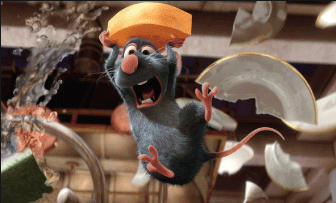By Steven Snyder
Well here’s a surprise few are likely expecting: A summer movie that seems to regard its audience with almost too much respect. On the heels of such idiotic family-friendly fare as “Spider-Man 3,” the third “Pirates of the Caribbean” and “Shrek the Third” (bad things always tend to come in threes), here’s “Ratatouille,” from the ever-reliable CG animation house Pixar (“Finding Nemo,” “Toy Story”) that towers over those films as The Simpsons towers over the daily newspaper’s cartoon page.
This is not so much a comedy as a rich and textured drama that earns some of its laughs from the occasional pratfall, but far more from the warm heart that’s beating beneath its CG surface. Audiences going into this film, particulary parents expecting something akin to “Monsters Inc.” or “Cars,” beware: This is a summer animated film aimed at your 12-year-old, not your toddler. And while the younger fans will surely enjoy the sight of these furry heroes in a man’s world, they will easily lose track of the intricate story, smart dialogue and complex themes.
All of which is a delightful thing. Here’s the smartest family film of the season that refuses to pander to its audience. It dares families to keep up with the story of young Remy (voiced by Patton Oswalt), a rat who finds himself disgusted with the rat way of life. As his brother eats whatever trash he can find littering the street, and his father warns him to stay away from the humans, who only want to kill every rodent they see, Remy keeps returning to a nearby television screen, mesmerized by the images of a famous chef Gusteau and the allure of mixing together not scraps of garbage, but fresh ingredients.
In some ways, it’s the classic tale of the city mouse and the country mouse, mixed together with such timely matters as class issues, elitist critics and a cosmopolitan lifestyle. Separated from his family, Remy finds himself in downtown Paris, sitting in front of Gusteau’s restaurant. Falling into the kitchen the same day a new kid is hired on — only because he is the son of Gusteau’s former lover — Remy suddenly finds himself covertly helping this new young cook with a sauce that badly needs some attention. When the diners rave about the new sauce, the executive chef turns to the new kid and demands more surprises, and as young Linguini (voiced by Lou Romano) turns to his new, rodent friend for help, Remy’s unexpected culinary career takes off.
The drama, though, sometimes funny and sometimes sad, erupts from this unlikely creature in the kitchen. As Remy helps Linguini with the spices and the stirring, resurrecting some old favorites from the Gusteau recipe catalogue, an unlikely bond forms between the rodent chef and the bumbling human. And as the world threatens to discover the truth about the tiny little health code violation hiding under Linguini’s chef hat, Remy realizes he’s playing a very risky game in the dangerous world of the humans.
There’s more joy in “Ratatouille” than laughs, and more sentiment than the silliness one has come to expect from such G-rated fare as last year’s “Curious George.” Really, the movie is less about one character’s survival (“Cars”), reunion with his parents (“Nemo”), or adventures with his friends (“A Bug’s Life”), than about the subtle, sublime joy of cooking, and the prospect of not only forging that perfect friendship but concocting that perfect dish. Indeed, as the big day arrives when the city’s foreboding food critic strolls through the door and places an order, we realize the film is not going to end with a comedy of errors but with the anticipation of something joyful and unexpected.
Technically and emotionally, “Ratatouille” is the most mature Pixar film yet. Imbuing their animated work with a greater sense of depth than we’ve ever seen before, they’ve given us a movie with definition, where the kitchen feels distinctly like a three-dimensional space. Meanwhile, writer and director Brad Bird finds one way after another of giving us the story from Remy’s perspective, zooming into spaces that a conventional camera could never bring to a rat’s worldview.
Then again, none of it would matter if we didn’t care about who owned the set of eyes we were supposedly looking through. Late in the film, as Remy is torn between being a good member of his family and the rat community, and risking it all for a chance to live a lie in the kitchen, we feel for the guy. He’s not a wacky antihero, he’s a character we come to love, much like the film he stars in, and the studio that conceived of it. Some young kids may be bored by “Ratatouille,” but that’s because Pixar’s too busy wowing those who know a few things about dashed dreams, and the determination required to keep plugging ahead.


































